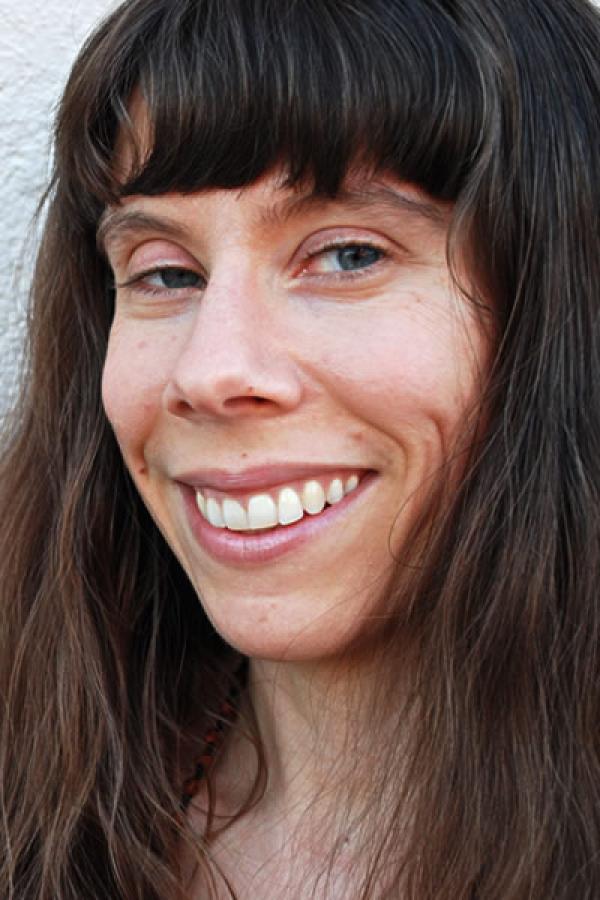Wendy Burk

Photo by Cybele Knowles
Bio
Wendy Burk is the translator of Tedi López Mills's While Light Is Built (Kore Press) and Arcadia in Chacahua (Bonnefant Press) and the author of two poetry chapbooks, The Place Names the Place Named and The Deer. Her work appears in VOLT, InTranslation, Terrain, Tin House, Spiral Orb, Colorado Review, and other journals. She is the co-author of Borderlands Theater's annual A Tucson Pastorela, the longest-running theater tradition in Tucson, Arizona, and (F)light, a song cycle about migration along the northern and southern borders of the United States. A three-time artist-in-residence with the National Park Service, she likes to spend time outdoors but has a wonderful 'inside job' as the librarian of the University of Arizona Poetry Center.
Translator's Statement
Out of Tedi López Mills's wide-ranging work, Contracorriente (Ediciones Era/CONACULTA, 2006) contains the poems that I keep changing my mind about. Are they poems of the self, of memory, of landscape, of time? Here I border on sacrilege because I know that the author would not want me to make up my mind. In fact, that is the point of the book. The poems in Contracorriente expose a mind moving fast as water, much faster than self-definition.
Lately I've been thinking about the poems from an ecopoetical lens, drawing parallels to the work of Kim Hyesoon as translated by Don Mee Choi. Where Kim creates hotly embodied 'ratscapes' surging with violent energy, López Mills renders a river as a cool but contaminated space, choked by trash, yet able to move swiftly, propelling its detritus forward.
The poems of Contracorriente also present a hybrid rural/urban zone inhabited by allegorical animals, such as roosters and cows, that are commonplace in Mexican cities but might bring a note of surprise to U.S. urbanites. (As urban farming increases in popularity in the United States, perhaps this aspect will change.) In engaging with what she sardonically cites, in Poem U. of the sequence, as "lo genuinamente mexicano" -- the 'true' or 'genuine' Mexican -- López Mills underscores that Mexico is defined by physical and philosophical contrast.
I thank the NEA for the opportunity to continue working with and changing my mind about these poems. The fellowship is especially meaningful to me as a Southern Arizona resident working with a Mexican writer at a contested time in our corner of the world.
"A" by Tedi López Mills
[translated from the Spanish]
Rivers of water, lone rivers of lanky, clouded water, squeezed
by two flanks, rivers of dirty water bucking their easy backs
against traps, battered metal facing the day's rearguard,
its luminous surge under leaves obscured by a haze
that I imagine as dense and push past smoothly
into the wetlands where rivers of water punish the banks
with their greedy, slurried pulse, mud thickened
in the rocks' drag, uprooting, obliterating any
earthly road, as if no distance could ever be measured
except by rivers of water pouring themselves from the breach
with their invading waters, high waters altering the thicket's
rough topography and thoughts about rivers of water in my head
mixed up with memories, not with the rivers
of water themselves, heard but unseen: meticulous,
shy, proper, harpooned by the sweet eternal
noonday sun, rivers so sleek that the hand always
sinks into the same water or its ghost and gropes
for anything that the depths might release,
rivers of water where I am and have never been, time's
presence, clock starting up for a different water, one that hangs back
except when it works its magic breaking levees, crossing borders, scaling walls
as ancient as its meander, but then is gentled, slow water
grazing me, offering up a mitigated turbulence,
river of real water, sudden river or silver pool upstream with its
hobbled flow sifting garbage, skirting all that it kills, that it twists,
that it parches in the ditch, trickling its last drop down
to a shadeless bend where the remains of another river swirl
into sight and again with their water begin begging the question, wiser
the eye than the stammering ear's fortuitous gold, louder
the circumstantial river, sun's glare digressing towards a letter,
luck's deepest swerve, mind's casuistry: what do I see,
what do I invent?
About Tedi López Mills
Tedi López Mills is one of Mexico's foremost poets writing today. Born in Mexico City in 1959, she studied philosophy at the Universidad Nacional Autónoma de México and literature at the Sorbonne. She is the author of ten books of poetry and two essay collections, several of which have received national literary prizes, including the Premio Xavier Villaurrutia, "Mexico's Pulitzer Prize," for her verse novel Muerte en la rúa Augusta (2009). López Mills sets the pace for her contemporaries with work that is linguistically inventive and philosophically rigorous. She invokes the classics, the troubadours, and the pastoral tradition with an underlying skepticism about language, landscape, and causality that keeps her work current, engaging the eye while troubling the "I."

